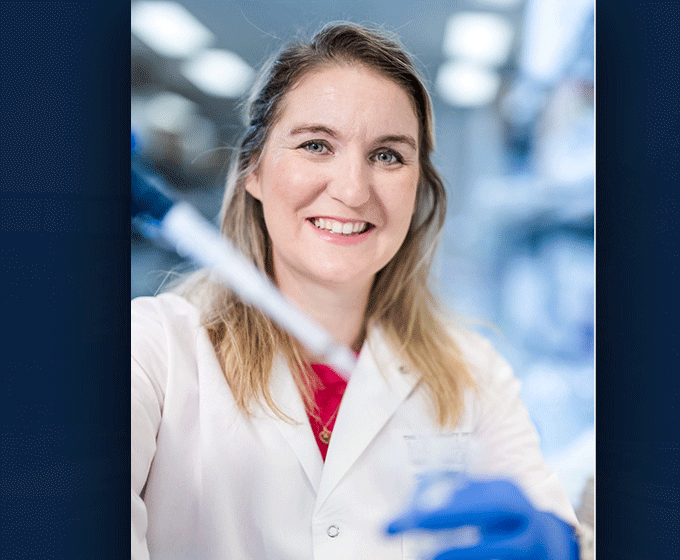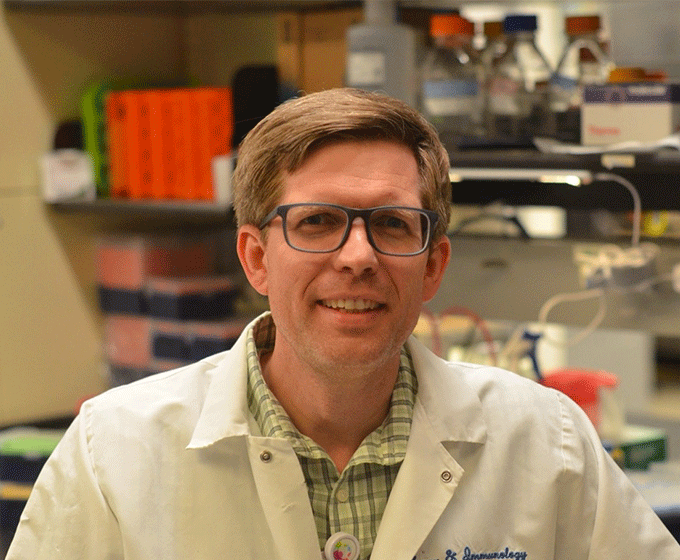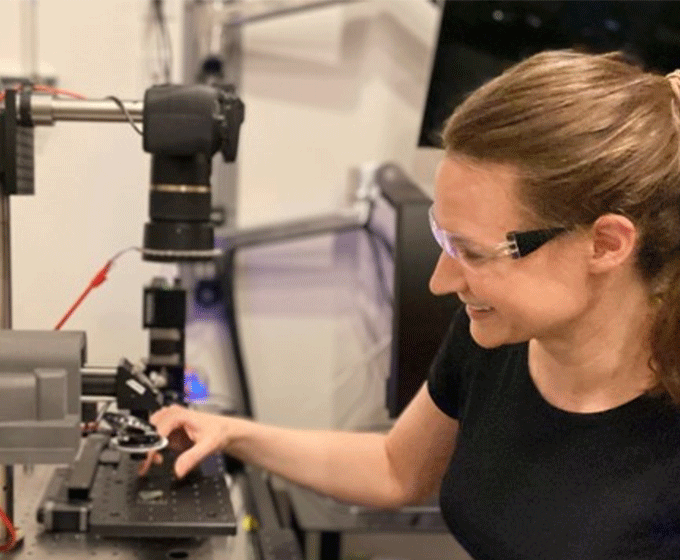
Margie Sutton ’10 works in her lab at the MD Anderson Cancer Center.
OCTOBER 10, 2024 — Many UTSA alumni now working as professional researchers began their research journey as undergraduate students. They credit those formative experiences with sparking a lifelong passion and opening doors to a fulfilling career.
Research first caught the attention of UTSA alumnus Ty D. Troutman ’06 while he was studying for his B.S. in biology in 2004. He learned about research opportunities through a flier.
“I learned that I was eligible for these programs and quickly submitted my application and began reading the research profiles of participating faculty,” said Troutman. “My research interests in bacterial pathogenesis and immunology led me to Dr. Bernard P. Arulanandam. I contacted him and convinced him to allow an untrained but motivated undergraduate to come learn in his lab.”
 Ty Troutman ’06 works in his laboratory at the Division of Allergy and Immunology at Cincinnati Children's Hospital Medical Center.
Ty Troutman ’06 works in his laboratory at the Division of Allergy and Immunology at Cincinnati Children's Hospital Medical Center.Troutman was also mentored by M. Neal Guentzel, and he collaborated with Karl E. Klose and his lab. His primary focus was studying how innate components of the immune system protect against Vibrio cholerae, the bacterium responsible for cholera.
“My conversations and experiences with the research faculty at UTSA and my colleagues within their labs solidified my desire to attain graduate education and pursue research as a career,” said Troutman. “I learned how to think critically about experimental design, interpretation of data and how to apply my imagination to developing new hypothesis testing strategies.”
Troutman worked as a research assistant at UTSA for two years before obtaining his Ph.D. in immunology at UT Southwestern Medical Center. He now works as an assistant professor at Cincinnati Children’s Hospital, where he studies immune cells called macrophages, an interest that emerged in his undergraduate research assistantship.
“The value of my undergraduate research experience cannot be overstated,” said Troutman. “This experience laid the foundation for my success as a graduate student and postdoctoral fellow and has propelled me into the position of running my own research program at Cincinnati Children's Hospital.”
UTSA alumna Margie N. Sutton ’10 was pursuing her bachelor’s with a double major in chemistry and biology in the UTSA Honors College when she had the opportunity to perform research in the laboratory of Doug Frantz, UTSA’s Max and Minnie Tomerlin Voelcker Fund Endowed Chair in Chemistry.
“In his lab, I utilized the chemistry developed in the group to derive tri-substituted pyrazoles from stereo-defined enol triflates, which served as the central core of a small molecule library I developed,” explained Sutton. “Then we shared these small molecules with collaborators to see if they were effective in the treatment of a number of diseases such as diabetes, neurodegenerative disease, osteoporosis and cancer.”
Sutton had always been interested in science and medicine, and through this early experience she began to envision a career in research.
“During my undergraduate research experience, I got to see first-hand the difference Dr. Frantz was making in this world through his research, and that was very inspiring to me. He is a treasured mentor, a gifted teacher and an inventor whose discoveries are changing people's lives without them even knowing it.”
After graduation, Sutton completed her Ph.D. in cancer biology and translational research at the MD Anderson UTHealth Houston Graduate School of Biomedical Sciences, where she now works as an assistant professor and director of education. She is currently working there on a project aiming to repurpose a class of cardiovascular drugs for cancer prevention.
For Sutton, research has been a fulfilling field.
“The opportunity to discover something new almost daily, to inspire others and contribute to advancements across multiple fields makes it a really rewarding career path,” Sutton said.
 Ashley Murphy ’16 conducts research in the SHERLOC lab at NASA JPL with a SHERLOC analog instrument.
Ashley Murphy ’16 conducts research in the SHERLOC lab at NASA JPL with a SHERLOC analog instrument.UTSA alumna Ashley Murphy ’16 expanded her research skillset while working as an undergraduate research and lab assistant for Alan Dutton in the UTSA Center for Water Research. She believes the experience taught her a range of technical skills and critical thinking skills.
“I used online geoscience databases to collect, organize and visualize data for a project Dr. Dutton was working on,” said Murphy. “My undergraduate research experience taught me to work under minimal supervision — an essential skill for graduate school — and allowed my passion for science to grow.”
The experience in the lab also helped Murphy define her career trajectory.
“As a non-traditional and first-generation student, I signed up for community college courses without a clear career goal in mind,” said Murphy. “When I transferred to UTSA, Dr. Dutton connected me to his colleague, Dr. Danielle Wyrick, a planetary scientist at Southwest Research Institute (SwRI), and she helped me realize I could work for NASA as a geologist, which was a compelling reason to pursue a graduate degree.”
After completing her bachelor's degree in geological sciences, Murphy pursued her Ph.D. at Rutgers University. She now works as a postdoctoral research scientist at the Planetary Science Institute, where she balances her focus between Mars 2020 mission support, collaborations with other researchers and her own research projects.
Murphy is also a collaborator on the SHERLOC instrument team. SHERLOC is a deep UV Raman and fluorescence spectrometer mounted on the arm of the Perseverance rover that helps scientists on Earth search for potential biosignatures on Mars.
Darrell Balderrama, director of the UTSA Office of Undergraduate Research, encourages students to view research as a crucial leg of their undergraduate journey.
“Undergraduate research at UTSA is where curiosity can transform into discovery,” said Balderrama. “It cultivates critical thinking and ignites a passion for inquiry, laying the foundation for lifelong learning and innovation."
The Office of Undergraduate Research can support students interested in research by connecting them with opportunities and mentors.
Balderrama sees many of his advisees go on to work in research professionally. He believes that their undergraduate research experience gives them a competitive edge.
“By participating in research, students not only contribute to advancing knowledge but also build a strong foundation for future academic pursuits or careers,” Balderrama said.
UTSA Today is produced by University Communications and Marketing, the official news source of The University of Texas at San Antonio. Send your feedback to news@utsa.edu. Keep up-to-date on UTSA news by visiting UTSA Today. Connect with UTSA online at Facebook, Twitter, Youtube and Instagram.
Move-in Day is an exciting time for incoming students. Students living in Laurel Village move in on August 22. The UTSA Housing and Residence Life (HRL) team looks forward to welcoming you all and helping you settle into your room.
Laurel VillageThe College of Sciences welcomes our newest Roadrunners to UTSA at VIVA Science! This interactive event connects students with faculty, staff, student leaders, and peers while highlighting the opportunities available across the College.
Outdoor Learning Environment 2 (OLE), Flawn Building, Main CampusWe're excited to welcome the new class of UTSA College of Liberal and Fine Arts (COLFA) students to campus! Move In To COLFA is strongly recommended for new students in COLFA because it gives you the chance to learn about the Student Success Center, learn how to do college successfully and meet new friends.
Galleria (MH 2.01), McKinney Humanities Building, Main CampusBuild connections with your Alvarez College of Business peers and learn more about the Career Compass program! This opportunity will provide fun interactions, giveaways and a chance to meet your next friend!
Richard Liu Auditorium (BB 2.01.02,) Business Building, Main CampusCelebrate the end of summer and the start off a great fall semester with The Housing Block Party! This event will have live music, carnival-style treats, artists, games, and activities galore. Come and join us for a night of fun!
Multipurpose Room/Lawn, Guadalupe Hall, Main CampusBe part of an unforgettable night as SOSA takes the field for its first public performance of the season! Experience the power, pride, and pageantry of UTSA’s marching band. Learn beloved traditions, practice cheers, and feel what it means to be a Roadrunner.
Campus Rec FieldsAfter getting your student settled in their room, connect with other UTSA families at our Family Get Together. Attendees need to RSVP for the event.
Rock & Brews Restaurant - 5702 Landmark Pkwy, San Antonio, TX 78249The University of Texas at San Antonio is dedicated to the advancement of knowledge through research and discovery, teaching and learning, community engagement and public service. As an institution of access and excellence, UTSA embraces multicultural traditions and serves as a center for intellectual and creative resources as well as a catalyst for socioeconomic development and the commercialization of intellectual property - for Texas, the nation and the world.
To be a premier public research university, providing access to educational excellence and preparing citizen leaders for the global environment.
We encourage an environment of dialogue and discovery, where integrity, excellence, respect, collaboration and innovation are fostered.